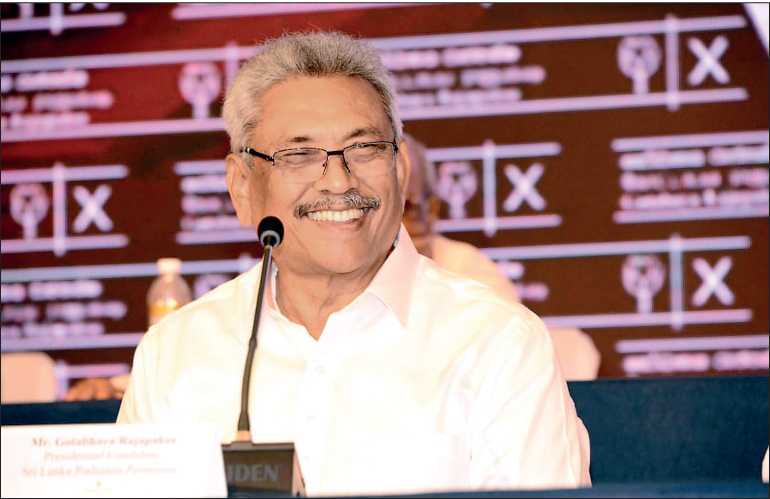Tuesday Feb 17, 2026
Tuesday Feb 17, 2026
Thursday, 13 August 2020 00:08 - - {{hitsCtrl.values.hits}}

Muslims do not need any special privileges from any government anymore, but only justice and equity, which are their democratic rights. Will Rajapaksa deliver them? – Pic by Shehan Gunasekara
“We were able to get 35-40% of the Muslim votes since they realised that Mahinda Rajapaksa’s Government would give them a better deal”, was reported to have been said by one of the Muslim representatives appointed under the National List by the victorious Sri Lanka Podujana Peramuna (SLPP). How he arrived at this figure remains a mystery.
 Even then, according to him, 60-65% of Muslim voters, knowing very well that SLPP would sweep the polls, decided to reject that party. This is a historic change as far as this community is concerned because it usually sails with the wind and votes for the winner. Discounting the number of spoilt votes and poor polling by the Muslim parties, a substantial percentage of the balance had gone in favour of the newly formed Samagi Jana Balawegaya (SJB) of Sajith Premadasa.
Even then, according to him, 60-65% of Muslim voters, knowing very well that SLPP would sweep the polls, decided to reject that party. This is a historic change as far as this community is concerned because it usually sails with the wind and votes for the winner. Discounting the number of spoilt votes and poor polling by the Muslim parties, a substantial percentage of the balance had gone in favour of the newly formed Samagi Jana Balawegaya (SJB) of Sajith Premadasa.
At the same time, Muslim voters have rejected Ranil Wickremesinghe’s United National Party (UNP), a historic Muslim fortress. ‘Eating briyani and voting UNP’, goes a popular saying about Muslim politics. How does one explain the change in 2020? Is it the beginning of a new trend to make national parties realise that they should earn the Muslim votes in future or just an aberration dictated by special circumstances? This author believes that special circumstances have forced a turning point in the voting behaviour of a new generation of Muslims.
To begin with, a large cohort of Muslim voters in common with other communities are not only young but also more politically educated and discerning than of previous generations. To these voters, it is not simply the vague and empty promises during election campaigns, but rather the actual record of accomplishments and failures by the respective leaders of contesting parties that matter. This is a new development not witnessed before. On that basis the leaders of the two major parties, Mahinda Rajapaksa (MR) of SLPP and Ranil Wickremesinghe (RW) of UNP, had abysmally let down the Muslim community especially after 2009.
With the defeat of the LTTE in that year and when waves of anti-Muslim violence were unleashed by ultra-nationalist Buddhist groups, both leaders did not even raise a finger in sympathy with Muslims. Of all such groups, Bodu Bala Sena (BBS) with its obstreperous secretary, Rev. Galagoda Ata Gnanasara, was the most prominent and vicious. In 2013 alone, according to a report submitted by SLMC to UNCHR, there had been a total of 51 violent incidents against Muslims in many of which BBS was actively involved. True, several of those incidents might have been just “trivia”, as one retired academic put it, yet they reflect the failure of law enforcement by the governments in power at that time.
That failure was crystal clear in the most serious anti-Muslim violence that broke out in mid-June 2014 in Aluthgama, which set a precedent for other episodes. During those riots MR was the President and Gotabaya Rajapaksa (GR), the current President, was Secretary of Defence. They did absolutely nothing to stop it or bring it to a close before it got worse. The reason for their inaction was obvious. They did not want to jeopardise the Buddhist vote bank and damage the President’s chances of winning the 2015 presidential race.
As if to rub salt on the Muslim wound, in September 2014 President MR spread the red carpet to welcome BBS’ special invitee Ashin Wirathu of Myanmar, a Buddhist priest whose 999 movement was closely involved in the genocide of Rohingya Muslims in that country. The Aluthgama riots and subsequent insult to Muslims certainly made the community reject MR at the 2015 Presidential Election. The new Yahapalana regime, with Maithripala Sirisena (MS) as President and RW as Prime Minister adopted the same policy of doing nothing when anti-Muslim riots broke out in several places, between 2015 and 2019. It was their inaction and incompetency that led to Zaharan’s terror group, the National Tawheed Jamaat, to execute that Macabre massacre on the Easter Sunday of April 2019, which naturally provoked even more widespread anti-Muslim rioting, once again led by BBS. Like MR welcoming Wirathu, President SR also added insult to Muslim injury when he pardoned and released BBS’ Gnanasara, who was spending his six years prison term for contempt of court. RW went along with SR. Muslims had no choice but to reject RW and his UNP in 2020. When GR became the President in November 2019 after a tightly contested and ethno-religiously fought election, Muslims expected justice from him. Of course, there were no anti-Muslim riots under him, but there were incidents which were deliberately caused to hurt Muslims. The erection of a Buddha statue in the middle of the night and in front of a mosque at Nelundeniya, the conversion of another mosque in Mahara into a recreation centre by prison guards, and the decision by the health establishment to cremate Muslim bodies of COVID-19 victims, based on a scientifically unproven argument that they transmit the virus to the living, but was upheld by the President with a political argument of One Country One Law, really hurt the Muslim community.
In the meantime, BBS and other ultra-nationalist Buddhist groups were left unchecked, for reasons of electoral necessity, to spread their hatred and venom against Muslims. All this made Muslim voters reject Rajapaksas’ SLPP. Thus, Muslim voters had virtually no choice in this election but to vote out of desperation Premadasa’s SJB. This does not mean that they supported his policies or ideology.
It is therefore safe to conclude that the 2020 election marks a turning point in the voting behaviour of Muslims. No political party should take for granted that the community would continue with its historical pattern of voting to the potential winner. Instead, parties should earn their votes from Muslims. That applies even to Muslim ethnic parties, which in any case have been discredited by the new generation. Muslims do not need any special privileges from any government anymore, but only justice and equity, which are their democratic rights. Will Rajapaksa deliver them?
(The writer is attached to the School of Business and Governance, Murdoch University, Western Australia.)